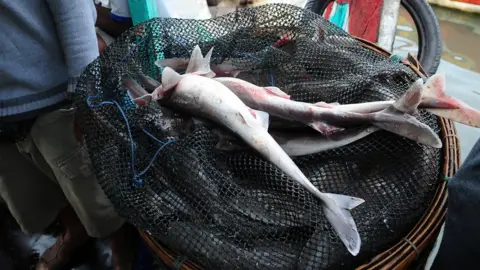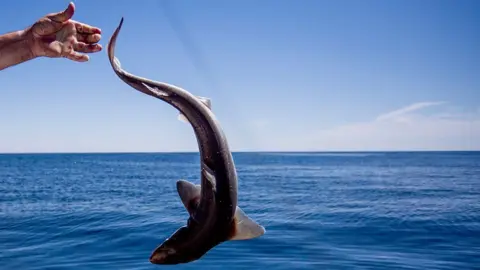Shark on UK plates highlights trade in endangered species
 Getty Images
Getty ImagesMeat from endangered sharks is finding its way on to the British menu, according to a study.
DNA tests show that shark products destined for restaurants include two species vulnerable to extinction.
Consumers may be unaware what shark they are eating - and whether it is from a sustainable population, British scientists say.
The UK is playing a continuing role in the "damaging trade in endangered shark species", they say.
One of the two threatened sharks identified - the scalloped hammerhead - is subject to international restrictions.
University of Exeter researchers say, despite the small number of samples studied, they have demonstrated the sale of threatened sharks, highlighting the global nature of the damaging trade in endangered species.
"The discovery of scalloped hammerheads in shark fins that were destined to be sold in the UK highlights how widespread the sale of these endangered species really is," Dr Andrew Griffiths told BBC News.
 University of Exeter
University of ExeterThe research, reported in the journal Scientific Reports, examined both shark fins destined for restaurants and shark steaks sold in fishmongers and chip shops.
It found that Squalus acanthias (spiny dogfish), a small shark classed vulnerable to extinction, globally - and, for one population in the north-east Atlantic, endangered, was the main shark being sold at chip shops, under the generic name huss, rock, rock salmon or rock eel.
The shark was probably imported from areas where stocks are sustainable, and generic names are permitted - but the scientists say it is difficult for customers to tell exactly what type of shark they are eating and where it comes from.
"It's almost impossible for consumers to know what they are buying," said Catherine Hobbs, also of the University of Exeter.
"People might think they're getting a sustainably sourced product when they're actually buying a threatened species."
The scalloped hammerhead shark was identified among 10 shark fins imported for the UK restaurant trade. The fins are often used to make soup, a celebratory dish in some Asian cuisines.
How do we know that sharks are ending up on the British dinner plate?
Once shark meat is processed, it is difficult to tell which species it comes from. Therefore, the scientists carried out DNA tests to see what was entering the human food chain.
They gathered more than 100 samples from chip shops and supermarkets in southern England. They also looked at dried shark fins imported into the UK.
A type of DNA analysis, known as DNA bar-coding, gave an insight into the shark species on sale.
A fragment of DNA can be matched with an online database known as the bar-code of life to identify the animal.
What did the study find?
Of the 78 samples on sale at chips shops in 2016 and 2017, about 90% came from the spiny dogfish.
Landing this shark is generally not permitted under EU rules, although that on sale was probably sourced from more sustainable stocks elsewhere, then imported and frozen, the scientists say.
 Getty Images
Getty ImagesOf the 39 fresh and frozen samples obtained from fishmongers, about half were assigned to Mustelus asterias (starry smooth hound), a type of hound-shark. This shark is judged of least concern in terms of extinction risk.
The Sphyrna lewini (scalloped hammerhead) was found in three of 10 dried shark fins on sale in the UK. These may have been imported and stored before international restrictions came into force in 2014.
This shark, which is not found in UK waters, is targeted for its fins and is in decline.
Commenting on the study, Simon Walmsley, Chief Marine Adviser at WWF said: "Endangered shark species shouldn't be ending up on people's plates as their weekend takeaway, particularly the spiny dogfish which is vulnerable and threatened with extinction."
Where is shark meat eaten?
Shark meat is eaten across the world and has been part of the human diet for centuries.
But between 2000 and 2011, global imports of sharks, skates, rays and other cartilaginous fishes rose by 42%, according to the Food and Agriculture Organization of the United Nations.
The international trade in 12 species is regulated because of concern over extinction risks.
But there is debate among scientists over which - if any - sharks can be regarded as sustainable and harvested for food.
"Sharks are inherently more vulnerable to overfishing because they don't produce many eggs and they take a long time to reach maturity - to be able to produce offspring," said Dr Griffiths.
Follow Helen on Twitter.
